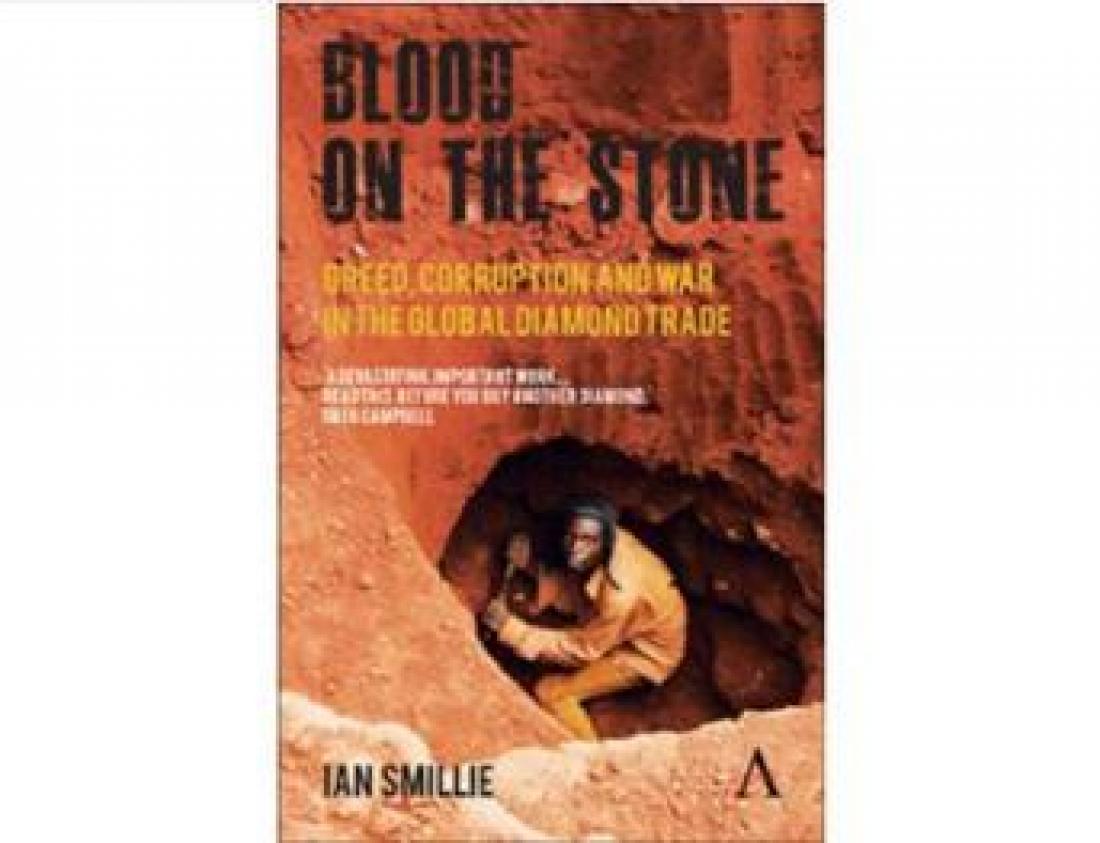Blood on the Stone by Ian Smillie
My interest in diamonds started 43 years ago, by chance. I went to Sierra Leone as a CUSO volunteer and was posted to the Koidu area, in the centre of the diamond mining area. There were 5,000 illicit miners in Koidu – it really was a Wild West scene.
I didn’t expect that diamonds would be part of what I’d be doing 43 years later. But a war started in Sierra Leone in 1990 and by 1995 we had a terrible situation. Half the population was displaced, most of the schools were closed, clinics had been destroyed. There was little in the way of international peacekeeping.
Back in Ottawa, we formed a small group called the Sierra Leone Working Group, hosted by Partnership Africa Canada. A Sierra Leonean-Canadian, Adrian Labor, who worked at IDRC at the time, said: “This is actually about the diamonds, and until somebody does something about them, the conflict will never be over.”
Kimberley Process
So we began the study, The Heart of the Matter, which turned into a 12-year project and was a major factor in the start of the Kimberley Process negotiations. In May 2000, the South African government called together NGOs, industry, and governments in the town of Kimberley, to discuss whether a solution could be reached. By January 2003, we had the Kimberley Process Certification Scheme for rough diamonds.
The scheme covers 75 countries and 98% or more of the world’s trade in rough diamonds. There’s no treaty – it’s simply the governments who came to the meeting and said they wanted to be in. But there were conditions: They had to pass national legislation saying they would conform to minimum standards in the Kimberley Process. So Congo, South Africa, the United States, Canada, China, Sri Lanka, the European Union, Russia, etc., are all in.
They all agreed that they will not trade rough diamonds with any country that is not in the Kimberley Process. And they will not export diamonds to any country unless they have a Kimberley Certificate saying the diamonds are clean. The scheme has the force of national law in more than 70 countries, which makes it much tougher than any United Nations treaty.
The Kimberley Process can’t claim direct responsibility for ending the diamond wars, but the three years of Kimberley Process negotiations were critical to ending those wars. Suddenly there was a bright spotlight on the diamond industry, and everybody who was behaving badly had to stop.
The Kimberley Process has a couple of serious problems, however. One of the most serious is that it operates on the basis of consensus. Every government that is party to the Kimberley Process must agree on an initiative or it won’t happen. If you want to expel Venezuela, for example, it only takes one country – Venezuela, for example – to object.
The Kimberley Process needs to end this ridiculous decision-making arrangement and introduce independent third-party monitoring. Major controversies that currently surround Venezuelan and Zimbabwean diamonds cannot be solved because of this issue, seriously compromising the ability of the Kimberley Process to guarantee conflict-free diamonds.
Diamond Development Initiative
Diamonds are mined in 16 African countries. In some, they’ve been a real engine of growth, but in many they’ve been a curse. There are about 1.3 million artisanal diamond diggers in Africa, mining the alluvial diamonds that are scattered over vast areas. These are usually not mined by big companies, but they are readily accessible to people with shovels and sieves.
In 2004, Partnership Africa Canada and Global Witness, a British NGO that was the other leader in all this, co-sponsored a study called Rich Man, Poor Man, which looked at the problem of artisanal diamond digging. About 15% of the world’s gem diamonds are mined by people who earn less than $1 a day and work in abysmal circumstances.
The Kimberley Process is about regulation and was reluctant to address the idea of development solutions to what are essentially development problems. So we created a new organization that complements the Kimberley Process, bringing together industry, interested governments, and civil society to tackle the development challenge that lies at the heart of the conflict diamond problem. The Diamond Development Initiative, an international NGO with headquarters in Ottawa, is now very much a going concern.



